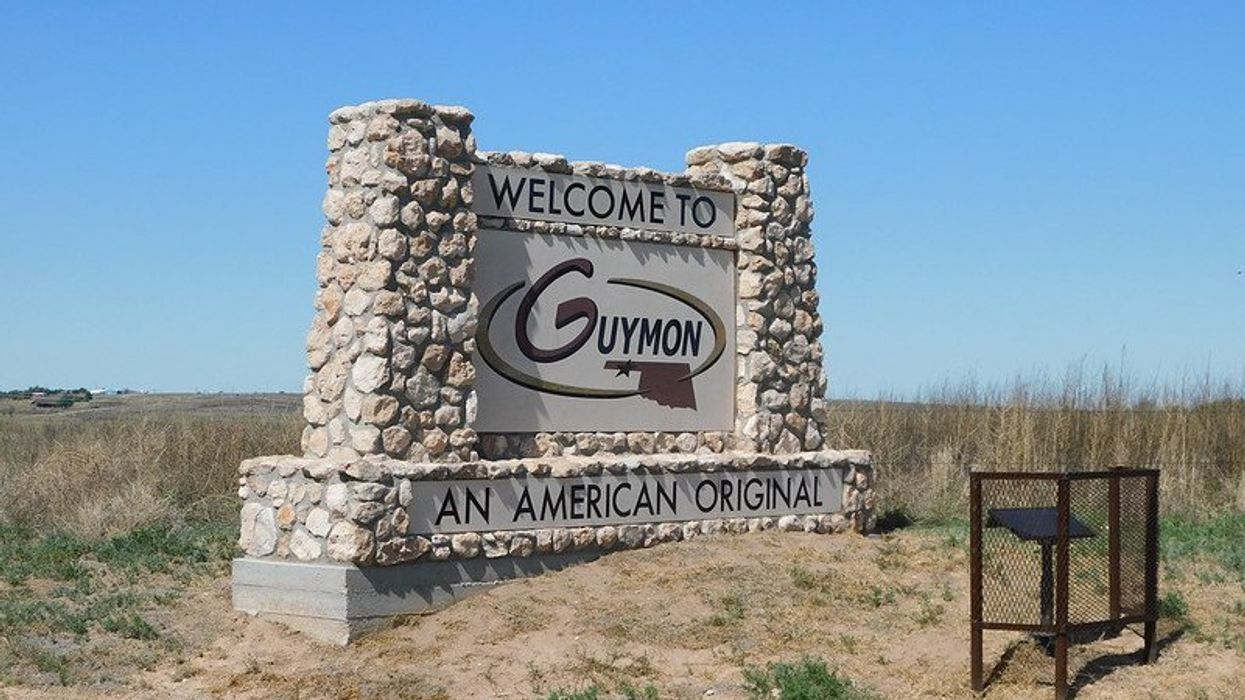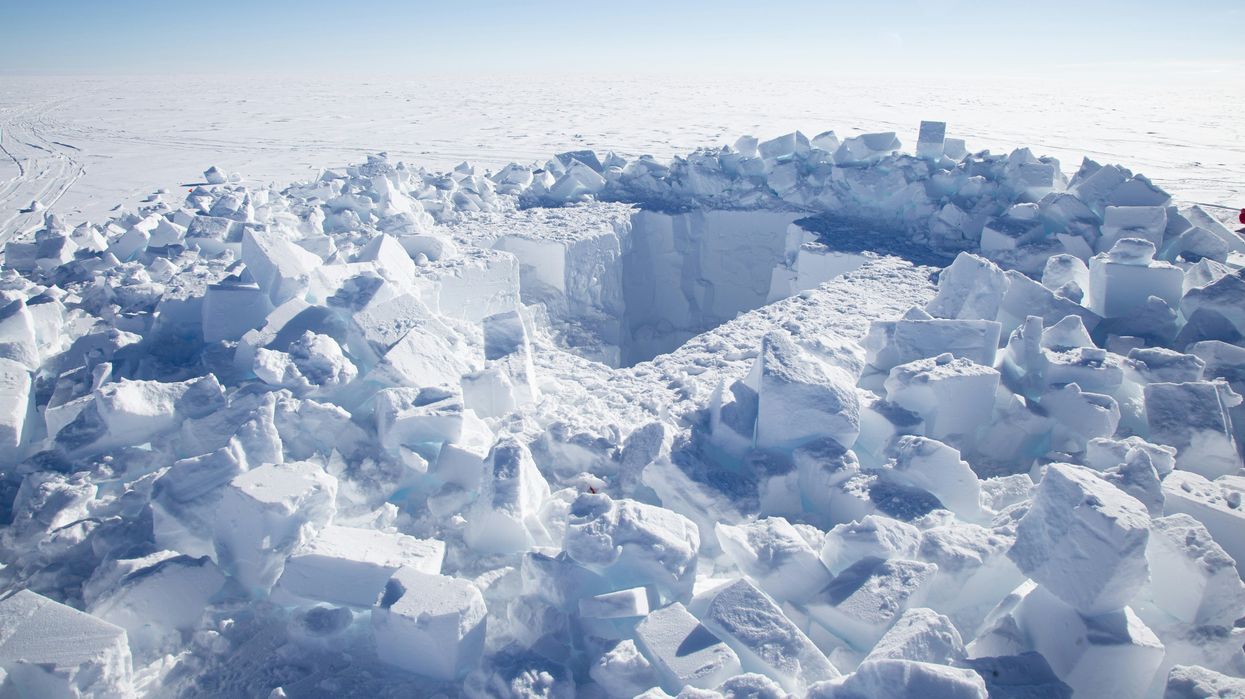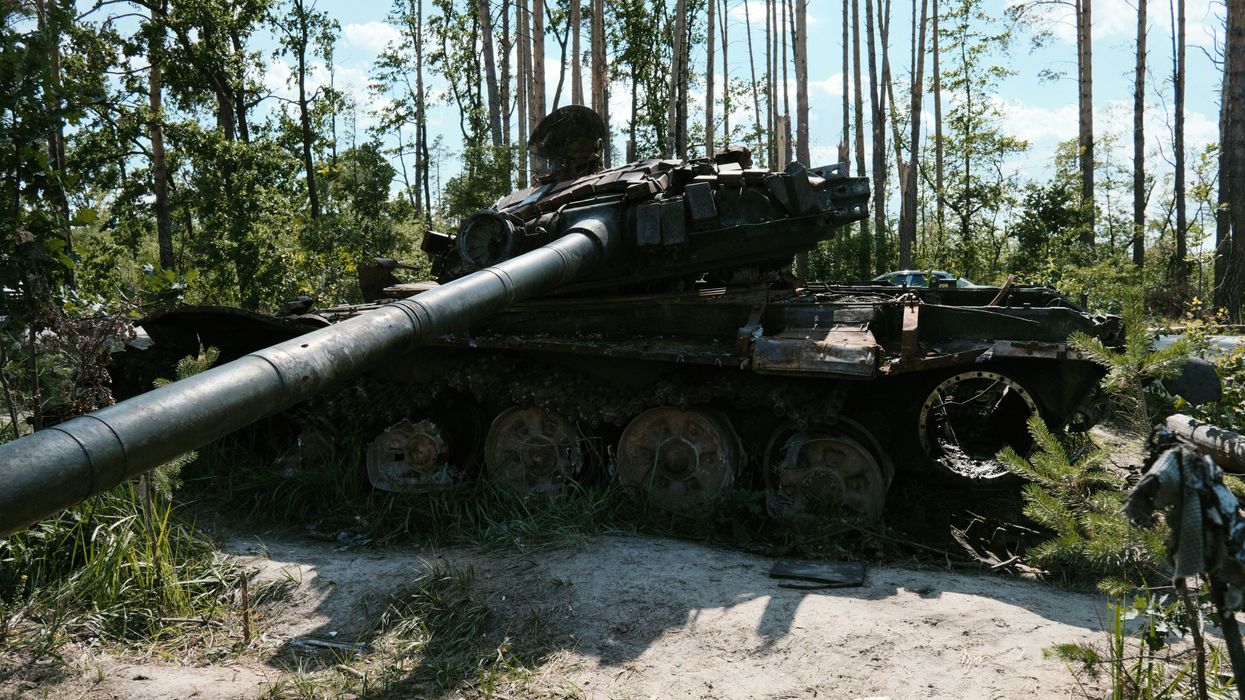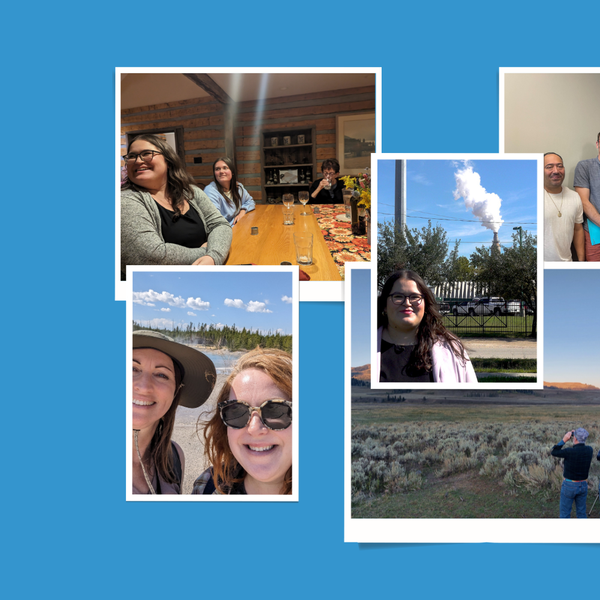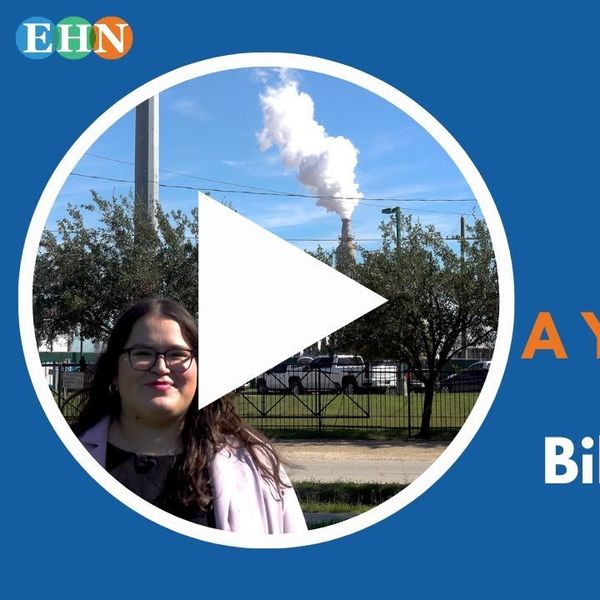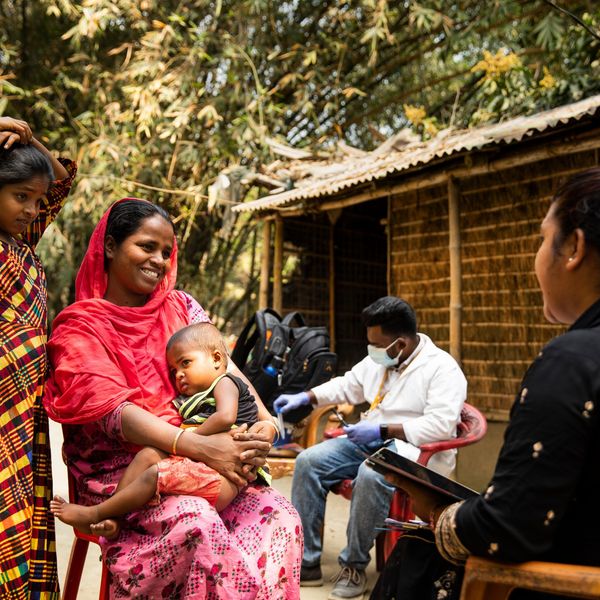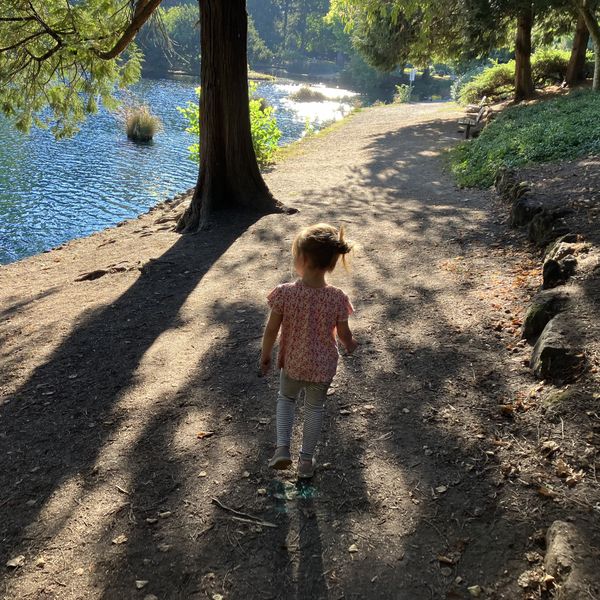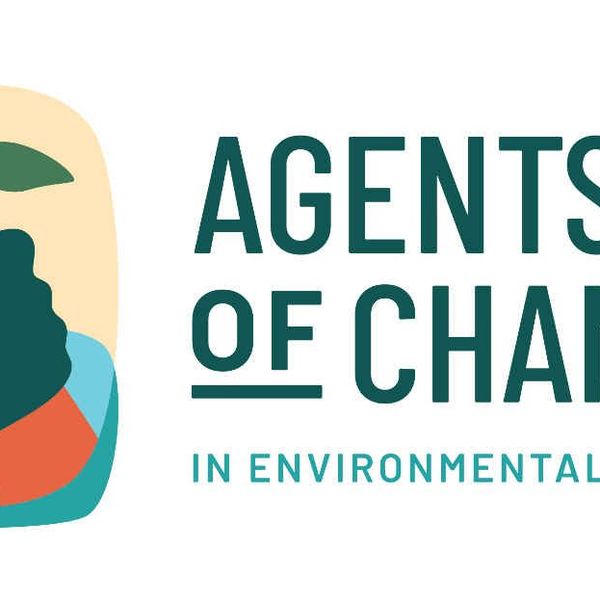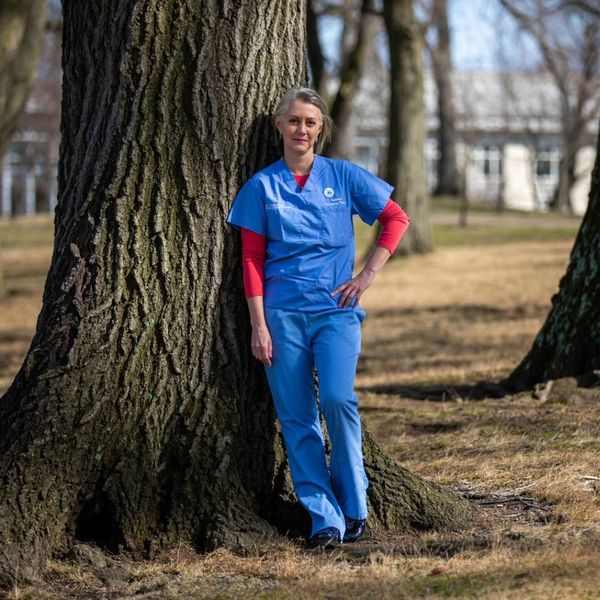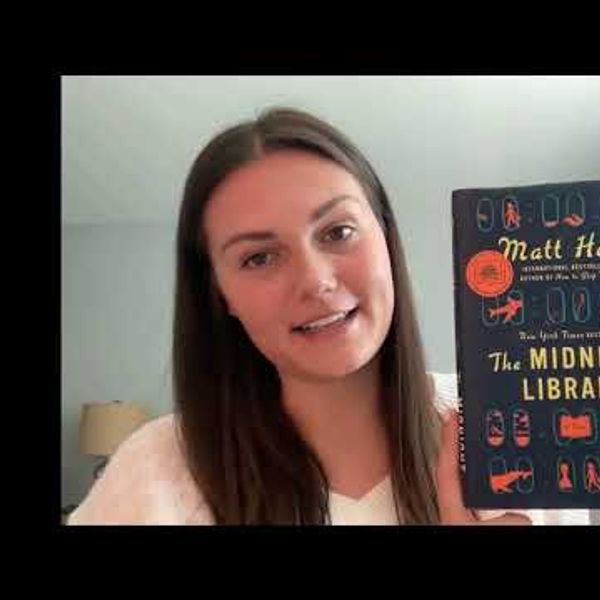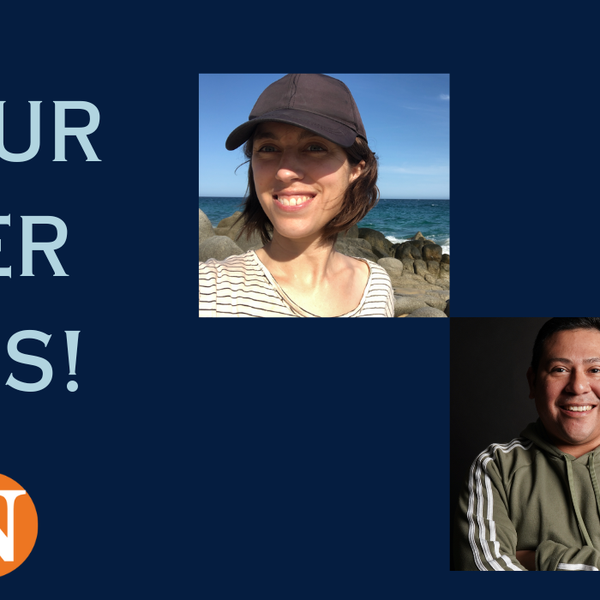Ebony Martin joins the Agents of Change in Environmental Justice podcast to discuss how Greenpeace has expanded its focus on voting and labor rights, peaceful dissent and protest, and free speech rights to push for environmental progress and justice.
Martin, the executive director of Greenpeace, also talks about how the organization bolstered its staff diversity, and what issues she’s watching as we head into a U.S. election year.
The Agents of Change in Environmental Justice podcast is a biweekly podcast featuring the stories and big ideas from past and present fellows, as well as others in the field. You can see all of the past episodes here.
Listen below to our discussion with Martin, and subscribe to the podcast at iTunes or Spotify.
Transcript
Brian Bienkowski
Hello and welcome back to the Agents of Change in Environmental Justice podcast, a partnership between EHN and Columbia University's Mailman School of Public Health. I'm your host, Brian Bienkowski, editor of Agents of Change and senior editor at EHN. Hopefully you're all settling into winter and are making some relaxing holiday plans. Maybe it's not technically winter where you're at, or I guess technically on the calendar yet, but it is definitely winter here. I've joined my first curly league. That's right, curling, I wouldn't say I'm quite graceful out there yet, but I'm definitely having fun. And speaking of fun today, I'm talking to Ebony Martin, the executive director of Greenpeace and notably the first black woman executive director at a legacy environmental organization. We talk about her journey in activism, some of Greenpeace's recent environmental victories and why the organization has expanded its focus to voting and labor rights. Enjoy. All right, well, I am super excited to be joined by Ebony Martin Evany. How are you doing today?
Ebony Martin
I'm great, how are you?
Brian Bienkowski
I'm doing wonderful. And where are you today?
Ebony Martin
I am in Washington, DC, on Piscataway territory in our offices.
Brian Bienkowski
Awesome. Well, thank you so much for doing this. We are so excited to have you join us. And I want to start go back a little bit before your current position. So can you talk about how and why you became interested in involved in environmental justice in the first place? And some of your work as a justice advocate prior to joining Greenpeace?
Ebony Martin
That's a great question. So I was always sort of the rebel in my family, the one who asked questions when probably you weren't supposed to and press for answers. And when I would see things in the world that just didn't make sense – injustice, people hungry and starving – I wanted to know why. And I wanted to know what we were doing to address it. And always kind of had a passion for that. And it may have gotten on folks nerves, because I pressed them out so much. But I often say when I came to Greenpeace, I found my people, because we all use our voices to speak out against injustice and to speak truth to power. So it just seemed right that I ended up in this organization, didn't know I will be executive director, but the values and the mission of the organization very much aligned with who I am as a person. And so it's my place. It's my assignment.
Brian Bienkowski
Before we zoom in on some of the issues you all are looking at, I think most people think of Greenpeace when they think of environmental organizations that one comes to mind. So I want to know, what are the environmental issues that keep you up at night?
Ebony Martin
So many. I mean, we are living in the climate crisis, it's not like it's coming. We are in the midst of it, we see 100-year floods occurring now every five years; we see our oceans are boiling. We see, we had this hottest summer on record. And we know that the number one driver of the climate crisis is the expansion of oil and gas infrastructure, and especially in communities that look like mine. And so if we are serious about resolving this issue, and this crisis that's impacting so many, we have to stop the expansion of oil and gas. And so that is what keeps me up. Because we still are, we know that this is the cause. But we haven't seen to turn off the tap yet. And so I think that's the greatest thing that keeps me up at night. And then I would say the second thing is the attack on our democracy right now. And one of the things that we should be using is our democracy. That's a tool that we have to ensure that our environment is is habitable. And right now we see a number of different tactics, including voter suppression, anti-protest laws, bogus lawsuits, a number of things that are designed to take our voice away and designed to kind of silence us when we want to speak out or when we want to take action against this crisis.
Brian Bienkowski
I'm really glad you brought that up, because that's one of the things I noticed when I was looking at the work you all are doing right now is... I think a lot of people still think of Greenpeace as a very biodiversity-focused organization, you know, saving the whales and stuff, because of all the very high profile work that the organization has done there. But I've noticed front and center right now, as you mentioned, is a focus on voting rights, peaceful dissent, and protest, free speech rights. Can you talk about why these issues are so front and center for Greenpeace and how they intersect with environmental progress?
Ebony Martin
Yeah, what we are seeing now, and this attack on our democracy, is we're seeing fossil fuel companies, oil and gas companies, and really many politicians on the right, and law enforcement sort of joining together to develop like a multi-pronged strategy to kind of crush dissent, and quell, quell, to push back on climate action. And we see this in a number of ways. So a lot of the anti-protest laws that they have passed since 2016, after Standing Rock, are specifically targeting fossil fuel infrastructure and buildout. And now we have about 60 laws 60 laws now protecting these facilities. And the penalties for speaking out or for protesting are very draconian. And this is, we also see, you know, with the voter suppression, some of the laws that we want to push to get across the finish line, if we can't even go vote for those, those laws to get across the finish line. When we're in Rocky territory, we also see what has happened in Cop City, with many of the organizers who are just simply trying to protect their land, protect the community have now been charged with RICO. And that is a that's an organized crime law. So it's really the criminalization of protests and the criminalization of even using your voice. And that's supposed to be a First Amendment right: protected speech. And we see that disappearing. And if we lose those tools, we're in pretty bad shape. So that is why Greenpeace is actively working to defend our democracy and to ensure that everyone's voice counts, and to ensure that this planet and our environment is habitable.
Brian Bienkowski
I have to say, when I saw that you were all working on those issues, it made me feel good, because all of these issues as as I'm sure we'll talk about more, and as you know, way better than I do, are so intersectional. And the fact that the organization is thinking outside of silos is such a good thing. But we got very serious, they're very quick. And I want to take a quick step back, everybody on the podcast, I've been asking, what is the defining moment or event that shaped your identity. And I want to ask you that as well. And that can be personal, professional, whatever you think.
Ebony Martin
I think the defining event that shaped... has helped shape my identity is becoming a mom. You know, I have two boys. And they are like extensions of your heartbeat outside of your body. And you want to do everything in this world to protect them and to ensure that no hurt or harm comes near them. And that they had the best opportunities that they can have to be successful. And so everything that I do when I wake up in the morning is for them when I'm fighting for it's for them, I want them to have the same tools that I have. I want them to have clean air and clean water. And being a mom is one of the the greatest gifts that I've ever received. And so I think that shapes a lot of my identity, my values and who I am as a person.
Brian Bienkowski
You mentioned when you talk about fossil fuel infrastructure, and I know that goes beyond just greenhouse gases into air pollution and dirty water. You mentioned they look like communities like yours. And unfortunately, communities like yours haven't been reflected in leadership positions a lot. So you are the first black woman to lead Greenpeace. And from what I understand and I could be wrong the first black womaneExecutive director for a national legacy environmental organization. Every time I read those it's it's it shouldn't surprise me but it's it's insane that these things are still that these doors are still being broken down. But can you talk about the challenges of being a woman of color in this field, how you overcame them and what it means to be a, you know, a trailblazer in this regard?
Ebony Martin
Yeah, I think about this a lot, because as you said, it's been 51 years Greenpeace has been in existence and I'm the first. And even if you look at the broader environmental movement, I am the first Black woman, like ypu said, in a legacy, environmental organization. But we are starting to see a shift, where the leadership is reflective of the communities that are most impacted by the climate crisis. And I think it's necessary to center our voices in the solutions and in the strategies that we come up with. But when I think about myself as as the first one in this role, when I was a kid, on Sunday morning, my father used to turn on the radio, and there was a song that said, I'm coming up on the rough side of the mountain, I'm doing my best, just to make it in. And I often think about my journey, because it's like, I'm coming up on the on, going through some terrain, that has no pathway for me. And the higher you climb, the harder it is to breathe. And you have to kind of like use your tools to stake out every step. And there are often challenges that you didn't expect, but you knew it was gonna be some challenges thrown at you. So it's like climbing a mountain. But it is, again, my assignment, and I need to climb that mountain so that I can create pathways for others. So they don't have to struggle. And so that they can know that it's possible. And so we can climb, and we can conquer mountains, it is possible and that and that's how I see my legacy in this work.
Brian Bienkowski
And you are pulling some others up the mountain with you. I saw that in the 10 years that you've been with Greenpeace, that staff of color a Greenpeace has gone from 13% to 55%. And that is, that's incredible. First of all, that's excellent. How would How was this accomplished? And what can other organizations learn from this?
Ebony Martin
It was another mountain. And it's something I'm incredibly proud of. And this was a mountain that I did not climb by myself. We had a team. And it is important that leadership, not just talk the talk, but they actually walk the walk. And the way in which we may change in the organization was really changing from the inside out. So we had to look at everything, our policies, our procedures, our compensation, how we promoted how we hire, and we had to really revamp many of our processes to ensure more equitable outcomes. There was a lot of research, a lot of conversations hard conversations many times, because we can often look and see when we're at the top of the mountain and celebrate. But we forget that journey and how hard it was on the way up the mountain and how many obstacles we've had to overcome. But it it it can be done. And it is possible. It requires unity. And it requires that folks, everyone knows their place and their role. Because it's not just one person's job to advance justice in an organization, everybody has, has to own it. And that's the only way that I think that it's been possible in the organization is that our staff have all, at every level, taken ownership of their role, and what it looks like for them personally to advance justice in our organization and in our work.
Brian Bienkowski
So that's a massive internal victory, at least in my eyes. But um, can you talk about some of the environmental wins, you know, externally on some of the advocacy work that Greenpeace has had recently?
Ebony Martin
Sure, all we do is win win win no matter what, you know, because we fight every day, we are fighters. And we have had like some amazing victories over this past year alone. One which we're celebrating and riding high off of is the passing of the Oceans Treaty. And this has been a 10-year-long campaign that we've worked on with our entire global network to get this across the finish line. And to see I think, at last count 81 countries, have signed, including the US, is huge. So that's something that I'm really proud of. Something else that we've been working very closely with is the workers, specifically auto workers. We have been joining the picket lines with them, and demanding that they are taken care of in a just transition as we move from gas-fueled cars to electric cars, we can't leave our workers behind as we, as we as we implement solutions to ensure that we have a more livable planet. And so we joined the picket line with them. And we were delighted to hear that General Motors has committed to making its electric vehicle jobs, also union paying jobs. So that's a huge victory. And we think this will set a precedence with other auto industries and companies. And then another huge one we just had was around legislation in California, specifically with HB421. And that was a bill that was meant to reform the referendum process in California, to ensure that voters voices are heard, and that corporate interests can't come in and buy back a vote. And so this law will help us especially as we move into advocating to ensure that the oil setbacks that we won, aren't reversed. And so that is another huge victory that that we have. But we work on a lot of different things in a lot of different ways. And I think the biggest victory is our win over a bogus lawsuit. It was called a slap suit. This is another way that they're undermining our democracy, slap suits are Stanford strategic lawsuits against public participation. And what they do is basically they're meant to bully and intimidate organizations and individuals who speak out against companies that cause environmental harm, and what they want to do is bankrupt you. So they sued us for $100 million. And after seven years of fighting, we finally got it thrown out. And we won it. And so we have another big, big battle coming up. We have another lawsuit similar, what is is a slap suit coming up in July, with Energy Transfer in North Dakota, and we are were preparing to fight that one tooth and nail because the world needs a strong Greepeace. And so we will, will never go down. You can't think a rainbow.
Brian Bienkowski
When I asked you earlier, what keeps you up at night? People trying to bankrupt you with
Ebony Martin
You know, I often tell people, they're like, "Well, how's it going?" I'm like, "Well, I'm trying to save the world. And I'm trying to save Greenpeace," you know about a balancing act some ways, but
Brian Bienkowski
yes, that is while we are dealing, I won't get into it. But our newsroom is dealing with some, some legal, some legal things to from some very big players. And it is stressful. And it is designed to silence people. That's what it's designed to do. Exactly that. And that's, I think I feel pretty comfortable saying that is just wrong. I do want to commend you guys, I don't really have a question here. But I am from Detroit, and grew up in a family of auto workers and union members. And this idea of merging of merging of the environmental movement, the labor movement, and just looking at doing things in a just way for people, I think is such a positive development. I talked about this a little bit earlier. And I think when we think about the energy transition people that left felt left behind in Appalachia and other areas. I think this is such an important work to get people on board and understanding that the environmental movement is not designed to put people out of a job, but rather have them doing jobs that are the future.
Ebony Martin
Yes, yes, that is. That's the point. And we acknowledge that our workers are the ones that have fueled the American economy, and have ensured that we've gotten back and forth transportation. And so no, we can't leave them behind, even our energy workers like No. As we transition, they transition with us and we make sure that we take care of them that's essential for solutions as we move forward.
Brian Bienkowski
So we are talking in the final few months of 2023, which I still have a hard time believing it's gone gone by so fast this year. And we're going into of course, another election year. It feels like we just did just did this. I don't know if any of us are ready. We're laughing but we're probably both crying on the inside. But what are you watching in terms of issues on the horizon and kind of the broader political landscape as we get into 2024?
Ebony Martin
so many things. I think to my point earlier, Greenpeace is nonpartisan. But we definitely see the strategy from the right with regards to the laws that are being passed to silence protest and dissent and climate action. And so one of the things we are paying attention to is making sure that those values and concerns and the people that are concerned about the environment are out voting. So that definitely mobilizing the vote and making sure that climate champions are being elected. Because we know if things swing back the other way, we will see no progress, and our planet just can't take that right now. So that is very important to us. We're also continuing to watch and we are supportive of the measures that the IRA has and continuing to lead on energy efficiency, efficiency, and also clean energy build out and manufacturing incentives. So we're really excited about that. However, we are concerned with the current administration, because they have issued more oil and gas permits on public lands, than even 45 did. And they also approved the Willow project, which would lock us into years of harm, as well as liquid natural gas build outs, and where the US is essentially becoming the gas station for the world. And that won't help ussave our climate and save our planet. So we are pushing the President in the administration to ensure that they are taking this seriously. And they understand we can't drill holes on one end of the boat and bail water out on the other we got to cut off the gas tap. So I think those are some of the major things we're paying attention to in the upcoming elections.
Brian Bienkowski
And speaking of elections, and I mentioned this earlier, when we have interns here, or maybe that was a previous call. But I was just talking about how when we have interns, they leave EHN, feeling very overwhelmed with toxics. And it's, it's this is daunting work. And it feels overwhelming to chuck, chuck the news every morning, especially when it comes to the environment. So I'm wondering what strategies that you employ to keep people engaged and not just wanting to check out and despair and kind of throw up their hands at these issues.
Ebony Martin
The major thing that combats despair is action. Despair is fueled by inaction. So the major thing that I tell folks to do is you can find a way or a role in this movement, somehow, some way to contribute to make sure and to basically empower yourself and know that you're actually becoming your solution, and not a part of the problem. And so there's a number of things you can do we have letter writing contests –well, not contests, but letter writing programs that basically encourage folks in other districts to get out and vote for climate champions. There are other things in your communities that you can take part of I know in my community, we often go out and clean that up off the Anacostia water line, we do things like composting, little things that I teach my kids so that they know that they are contributing to saving the planet as opposed to damaging it. If you're not an activist, because you know, some of us will go out and put our bodies on the line. But we also need folks that are doing the strategy, we need folks that'll bring the bill money if they come because ,we need folks that'll provide the food for us while we're sitting outside. There are just so many things that you can do. Getting involved with organizations like Greenpeace, your donations, your support, we have volunteer programs, there are there are a number of things. And I think the best way to combat despair is to get active.
Brian Bienkowski
So what are you optimistic about?
Ebony Martin
So I actually prefer to say I'm hopeful rather than optimistic, I think because hope is a choice. It's a conscious choice that you have to make, and it's something that I tell my staff a lot about, you have a choice in the morning you can wake up in despair or you can choose to hope and hope is having only positive expectations. And expectations are fueled by your actions. So you do have to take actions. But hope is an act of resistance and it combats adversity, and we have the ability to shape our own joy, we have the ability to shape positive outlooks, even in the face of hardship. And that's when we embrace hope. So I tell folks, when you don't wake up in the morning and feeling good, you have to give yourself something to feel good about. And that that's, that's, it requires action.
Brian Bienkowski
I'm noticing a theme here. We need to be taking action. And that is so in line with Greenpeace's strategies. So when you are not running one of the nation's largest environmental organizations, Ebony, what do you like to do?
Ebony Martin
I love spending time with my family and my church community. I'm an avid worship leader in my church. And when I'm not at church, I'm usually attending concerts with my kids and my husband. I'm going to Broadway different things like that. I'm also a music major. So anything having to do with music around the city, and impromptu concerts that they have, You might look up and see me there.
Brian Bienkowski
What do you play? Or are you a vocalist? Or what was your major?
Ebony Martin
I play piano probably up until my senior year of high school. My parents are a little mad at me because they think and I went to school actually, for vocal performance. You
Brian Bienkowski
should tell your parents you know, I'm, I'm kind of doing something over here.
Ebony Martin
Now they let up a little bit. They light up a little bit like okay, do you want me play piano or you want me save the world, Dad?
Brian Bienkowski
Kind of a little bit. A little bit going on over here. That's yeah, that is very cool. though. I play I play a host of instruments. And I always
Ebony Martin
You do?
Brian Bienkowski
Yeah, I play guitar. I play pedal steel guitar. I played mandolin. And I do feel like there's something about music that I will just take breaks because and play a little bit because I feel like it's good for the other side of your brain.
Ebony Martin
It is. No, I completely understand that my partner plays the guitar. And he will randomly and I'm like if I'm working at home, I'll hear the guitar strum and I'm like "honey, I'm on a call".
Brian Bienkowski
My wife has asked me Have you done any work today? Or are you working when she hears music? And yes, I'm I'm working. We're this is, I'm working on my brain? Well, Ebony, this has been so much fun. I just have a few more fun questions. Hopefully they're fun. And then we'll get you out of here. And these first three are just kind of rapid fire you can answer with one word or a phrase. My favorite thing to cook is
Ebony Martin
spaghetti.
Brian Bienkowski
My favorite coffee shop is
Ebony Martin
Colombia.
Brian Bienkowski
What was the highlight of the past week for you?
Ebony Martin
Oh, wow. Hanging out with my seven year old watching a WWE event.
Brian Bienkowski
And I'm gonna throw one more on here that I didn't prepare you for what was the last concert you went to?
Ebony Martin
actually went to go see D nice at the Kennedy Center a couple of weeks ago.
Brian Bienkowski
Very cool. That is excellent.
Ebony Martin
Celebrating Hip Hop 50th anniversary. Yeah.
Brian Bienkowski
That is so cool. My coworker is in. She is in Houston area in Austin. She had went to Austin City Limits and just saw a whole bunch of bands, but saw Kendrick Lamar. Yeah. And I was quite jealous, because I think he's brilliant. So yeah,
Ebony Martin
I missed him when he was at the Kennedy Center. So I had to get on the list. So now they tell me everybody's
Brian Bienkowski
well prepared. Hey. And last question. I've asked everybody this and you don't have to confine yourself to one word or a phrase, here's what's the last book you read for fun.
Ebony Martin
I'm reading "This as an uprising" Now. This is an uprising. And it's it's stretching my brain. Because I think sometimes we think strategy should look a specific way. But when you're movement building, that strategy is really fluid. And what you think won't work does work. And so you have to be bold and fearless and just try things. So
Brian Bienkowski
That sounds excellent. I bet our listeners will love that. And one of these days I need to put together a list of all the excellent suggestions that people had. Well, me this has been so much fun for me to get to know you and your work a little bit better. Again, I'm just heartened by the work that you all are doing there that I mentioned earlier and thank you so much for taking time today.
Ebony Martin
Thank you for having me. This has been a great conversation.
Brian Bienkowski
That is all for this week. folks. I hope you enjoyed my conversation with Ebony. If you enjoyed this podcast visit agentsofchangeinej.org and while you're there, click the donate button to support us. You can also find us on X and Instagram and please follow us on Spotify, iTunes, wherever you get your podcasts and rate, review, subscribe, tell a friend.
- LISTEN: Dr. Beverly Wright on how to keep environmental justice momentum ›
- LISTEN: Ashley James on protecting children from environmental exposures ›
- LISTEN: Jan-Michael Archer on the fight for environmental and workers’ rights ›
- LISTEN: Ana Baptista on supporting environmental justice movement building in academia - EHN ›
- LISTEN: Greer Hamilton on arts-based environmental justice research - EHN ›
- LISTEN: Aalayna Green on how race and gender intersect with conservation - EHN ›
- LISTEN: Jose Ramon Becerra Vera on democratizing science - EHN ›










